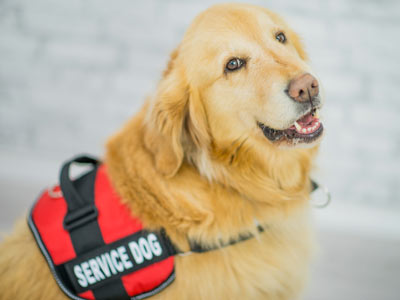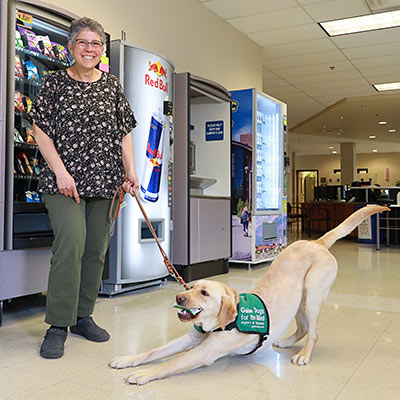
View Policy 7015: Service Animals/Pets.
Non-service animals are not allowed in TMCC buildings unless approved by the college. Non-service animals may be banned from outdoor public events on college property.
The Americans with Disabilities Act (2010 revised guidelines), defines a service animal as "a dog or miniature horse that has been individually trained to do work or perform tasks for the benefit of an individual with a disability."
Service animals are specially trained to guide individuals who are blind, alert an individual of an impending seizure or protect an individual during a seizure, alert people who are deaf, remind a person with mental illness to take prescribed medications, calm a person with Post Traumatic Stress Disorder (PTSD) during an anxiety attack, pull a wheelchair and fetch dropped items, or other duties as trained.
Service animals are working animals, not pets. Animals whose sole function is to provide comfort or emotional support do not qualify as service animals under the ADA (Americans with Disabilities Act). Non-service animals are not allowed in TMCC buildings and may be banned from outdoor public events on college property.
Service Animal Versus Therapy or Emotional Support Animal
- A service animal is an animal with a good temperament and disposition, which has reliable, predictable behavior, and is selected and trained to accompany people with disabilities at all times. The animal may be incorporated as an integral part of a treatment process for a person with a disability.
- A therapy/emotional support animal does not accompany a person with a disability at all times, unlike a service animal that is always with a person with a disability. A therapy/emotional support animal is not considered to be a service animal under this policy or applicable law.
Misrepresenting a Therapy or Emotional Support Animal as a Service Animal
NRS 426.805 states:
- “It is unlawful for a person to fraudulently misrepresent an animal as a service animal or service animal in training.”
- “A person convicted of fraudulently misrepresenting an animal as a service animal or service animal in training is guilty of a misdemeanor and shall be punished by a fine of not more than $500.”
Service Animal Terminology
- Partner/Handler: A person with a service animal. A person with a disability is called a partner; a person without a disability is called a handler.
- Pet: A domestic animal kept for pleasure or companionship. Pets are not permitted in college facilities, except the veterinary clinic.
- Service Animal: Any animal individually trained to do work or perform tasks for the benefit of a person with a disability.
- Therapy/Companion Animal: An animal with good temperament and disposition, and who has reliable, predictable behavior, selected to visit people with disabilities or people who are experiencing the frailties of aging as a therapy tool. The animal may be incorporated as an integral part of a treatment process. A therapy/companion animal does not assist an individual with a disability in the activities of daily living. The therapy/companion animal does not accompany a person with a disability all the time, unlike a service animal that is usually with its partner/handler. Thus, a therapy/companion animal is not covered by laws protecting service animals and governing their activities.
- Trainee: An animal undergoing training to become a service animal. A trainee will be housebroken and fully socialized. To be fully socialized means the animal will not, except under rare occasions, bark, yip, growl or make disruptive noises; will have a good temperament and disposition; will not be aggressive. A trainee will be under control of the handler, who may or may not have a disability. If the trainee begins to show improper behavior, the handler will act immediately to correct the animal or will remove the animal from the premises.







